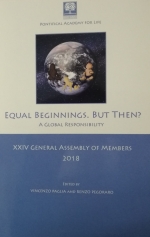Proceedings 2018 Assembly - Equal Beginnings. But then?

EQUAL BEGINNINGS. BUT THEN? A Global Responsibility
XXIV GENERAL ASSEMBLY OF MEMBERS - 2018
Edited by Vincenzo Paglia and Renzo Pegoraro
A new season in bioethical reflections is at hand. We are witnessing extraordinary developments in life sciences and in the new "converging technologies" (genetics, information technology, nanotechnologies and neurosciences), which open up unprecedented possibilities for interventions on living matter. The human body is exposed to practices that risk reducing it to the status of any neutral biological subject, as if it were an entity independent of the person rather than its basis in space and in history. This approach, veined with Gnostic contempt, risks obfuscating the symbolic scope of the body and its essential role in the advancement of a meaningful world.
On the other hand, globalization is profoundly transforming the context in which bioethical questions are posed.
Cultures find themselves coexisting in closer relations as a direct result of the growth in the movement of peoples and the intensification in communications. There is a growing public awareness that environmental phenomena and peoples' lives are increasingly interconnected. There is also a better understanding that inequalities and imbalances in the conditions of life in society and in the different parts of the planet are not due to random factors, but are the effects of choices that neglect justice and the legitimate needs of all the Earth’s populations, present and future.
There are many examples of problems related to clinical practice and biomedical research in which these interconnections are apparent. To cite only some which have the most immediate bioethical impact: the definition and compliance with the rules of scientific research that are the same for everyone and equally respectful of the dignity and rights of people; the principle of the prohibition of the commercial exploitation of the human body or its parts on the international market; the prohibition of interventions on the genome that introduce modifications destined to be inherited by descendants; the fight against the threat of bio-terrorism.
The classical topics of bioethics have therefore taken on a far wider scope. Then again, the number of themes dealt with has also expanded: food safety, inequalities in access to care and in the distribution of the results of scientific research, environmental factors on health.



